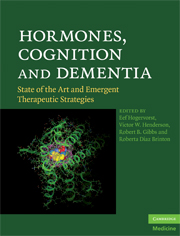Book contents
- Hormones, Cognition and Dementia
- Hormones, Cognition and Dementia
- Copyright page
- Contents
- Contributors
- Preface
- Section 1 Estrogens and cognition: perspectives and opportunities in the wake of the Women's Health Initiative Memory Study
- Section 2 Varieties of estrogenic therapy
- Section 3 Potential modulators and modifiers of estrogenic effects
- Section 4 Possible genetic factors related to hormone treatment effects
- Section 5 Testosterone, estradiol and men, and sex hormone binding globulin
- Section 6 Gonadotropin effects
- Index
- Plate Section
Section 4 - Possible genetic factors related to hormone treatment effects
Published online by Cambridge University Press: 06 July 2010
- Hormones, Cognition and Dementia
- Hormones, Cognition and Dementia
- Copyright page
- Contents
- Contributors
- Preface
- Section 1 Estrogens and cognition: perspectives and opportunities in the wake of the Women's Health Initiative Memory Study
- Section 2 Varieties of estrogenic therapy
- Section 3 Potential modulators and modifiers of estrogenic effects
- Section 4 Possible genetic factors related to hormone treatment effects
- Section 5 Testosterone, estradiol and men, and sex hormone binding globulin
- Section 6 Gonadotropin effects
- Index
- Plate Section
Summary
This chapter explains why two meta-analyses of treatment studies only found time-limited positive effects of estradiol in both women with and without dementia. The findings in women with dementia do not substantiate the “window of opportunity” theory. Negative effects of longer term treatment (>1 year) have also been reported in both women with and without dementia.
The meta-analyses reported that the most substantial effects of estradiol on cognition were seen in women who had undergone surgical menopause. Another large observational study found an increased risk for dementia when women had undergone surgical menopause. This chapter attempts to explain these findings by speculating that some women who are more at risk for medical indications for surgical menopause have particular genotypes implicated in sex steroid metabolism and synthesis. These genotypes expose these women to high estradiol levels. This may explain why these women show such strong responses to undergoing surgical menopause, as this induces a very sharp decline in their previously high estradiol levels. If these women also have genetic polymorphisms that predispose them to high levels of toxic estrogenic metabolites (such as catecholestrogens) this could lead to DNA damage. In the first instance that could lead to medical indications for surgical menopause, such as ovarian or endometrial cancer, endometriosis, cysts, etc. If these women are given estrogens at a later time in their lives, they might also be more susceptible to dementia, which has previously also been associated with DNA damage. The brain is apparently less able to compensate for this type of damage in later life, which could explain the more substantial negative effects on cognition and dementia risk found in the older women. Future genetic screening for these polymorphisms might allow more targeted treatment for those women who are not genetically at risk.
- Type
- Chapter
- Information
- Hormones, Cognition and DementiaState of the Art and Emergent Therapeutic Strategies, pp. 143 - 178Publisher: Cambridge University PressPrint publication year: 2009

